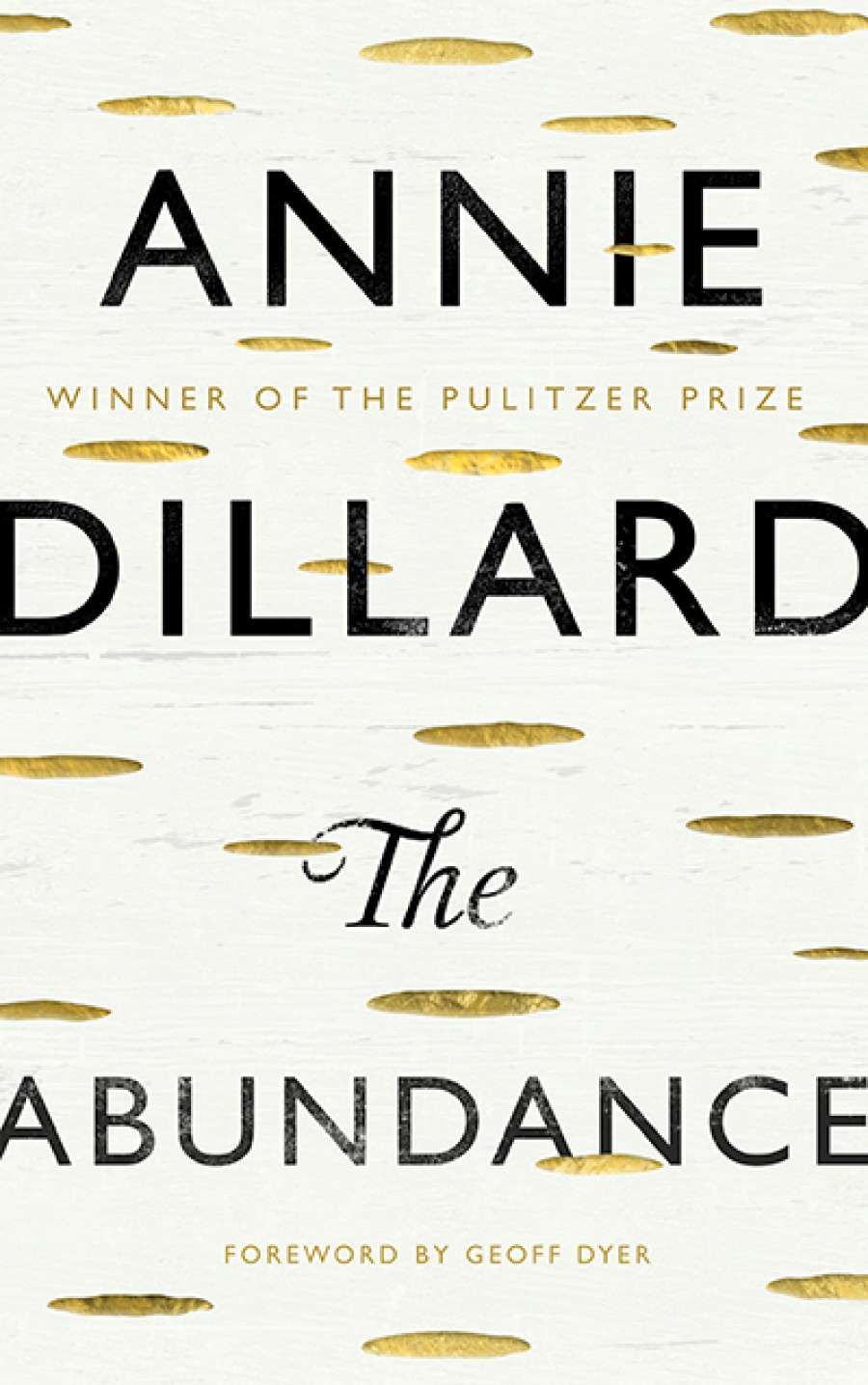
- Free Article: No
- Contents Category: Essay Collection
- Custom Article Title: Kevin Rabalais reviews 'The Abundance' by Annie Dillard
- Review Article: Yes
- Online Only: No
- Custom Highlight Text:
Read a few of the essays or chapter excerpts in Annie Dillard's The Abundance, and you might find yourself writing a letter to the author. Part of that letter might look like ...
- Book 1 Title: The Abundance
- Book 1 Biblio: Canongate $34.99 hb, 298 pp, 9781782117711
The Abundance offers twenty-two previously published chapters and essays from a singular body of work. 'What kind of writer is Annie Dillard?' asks Geoff Dyer in his introduction. 'One of those, she decided early on, who chose to define herself in extra-literary terms: "an explorer of the neighborhood," "a fugitive and a vagabond, a sojourner seeking signs," and "a stalker, or the instrument of the hunt itself".' Dillard – a modern seeker in the vein of Henry David Thoreau – has spent her writing life striving (to paraphrase the author's Transcendentalist hero) to unearth those details in the world that enhance the quality of her days. To do so, she often looks no farther than her own window.
Consider Pilgrim at Tinker Creek. For her second book, in which she explored the natural world near her home in Virginia, Dillard received a Pulitzer Prize. Here and elsewhere, she trains a sharp eye on the everyday. She wants to be astonished, and her curiosity and wonder can be infectious. In her attempts to comprehend religion, the natural world, and the fabric of existence, Dillard questions whether beauty is 'the cruellest hoax of all ... [h]ow many days have I learned not to stare at the back of my hand when I could look out at the creek? Come on, I say to the creek, surprise me; and it does, with each new drop. Beauty is real. I would never deny it; the appalling thing is that I forget it.'
Dillard's seductiveness stems from her ability to see everything as though she is examining it for the first time. In an essay about the 1991 tsunami in Bangladesh, she writes, 'It's been a stunning time for us adults. It always is. Nothing is new, but it's fresh for every new crop of people. What is eternally fresh is our grief. What is eternally fresh is our astonishment. What is eternally fresh is our question: What the Sam Hill is going on here?' The important thing, she reminds us, is that we never stop asking the questions that might seem obvious but which linger just beyond our reach if we fail to examine them.
In The Abundance, Dillard guides us through the formation of sand only to ponder, several pages later, Galileo's thoughts on comets, Ruskin's theory of seeing, Thoreau's reliance on the senses, and the religious concepts of Pierre Teilhard de Chardin. She has taken Henry James's dictum, 'Try to be one of the people on whom nothing is lost.' Her work strives to comprehend the question, simple yet undeniably complex, with which she begins 'Waking up Wild': 'What does it feel like to be alive?' To answer it, she takes those long glances that many of us fear make us look foolish. She collects creek water in a jar and carries it home, dumping it in a bowl so that she can witness the life inside. 'What I see sets me swaying,' she writes.
 Annie Dillard (photograph by Phyllis Rose)While Dillard has always been difficult to classify, her legions of admirers have never failed to locate the generous spirit within her work. She combines the sensibilities of a naturalist and essayist and philosopher with the soul of a poet. Most of all, she proves to be a great observer, even if she claims otherwise. 'If Tinker Mountain erupted, I'd likely notice,' she writes. 'But if I want to notice the lesser cataclysms of valley life, I must maintain in my head a running description of the present. It's not that I'm especially observant; it's just that I talk too much. Otherwise, especially in a strange place, I'll never know what's happening.'
Annie Dillard (photograph by Phyllis Rose)While Dillard has always been difficult to classify, her legions of admirers have never failed to locate the generous spirit within her work. She combines the sensibilities of a naturalist and essayist and philosopher with the soul of a poet. Most of all, she proves to be a great observer, even if she claims otherwise. 'If Tinker Mountain erupted, I'd likely notice,' she writes. 'But if I want to notice the lesser cataclysms of valley life, I must maintain in my head a running description of the present. It's not that I'm especially observant; it's just that I talk too much. Otherwise, especially in a strange place, I'll never know what's happening.'
In The Writing Life (1989), her slim but abundantly inspiring book about work and the process of creation, Dillard writes, 'How we spend our days is, of course, how we spend our lives.' The following seems like advice for living as much as it does for writing: 'Why do you never find anything written about that idiosyncratic thought you advert to, about your fascination with something no one else understands? Because it is up to you. There is something you find interesting, for a reason hard to explain because you have never read it on any page; there you begin. You were made and set here to give voice to this, your own astonishment.'
As Dyer writes in his introduction, Dillard is 'a writer who never seems tired, who has never plodded her way through a page or sentence'. The Abundance is one of those books to keep close as company in our days. In it, we find a source of wisdom from a generous guide who reminds us, always, to seek and to open ourselves to wonder.


Comments powered by CComment